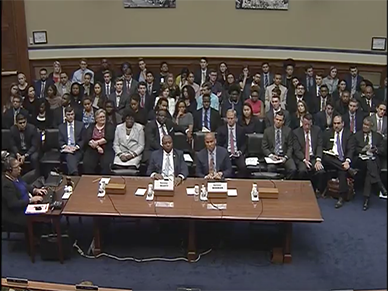
by Georgia Center for Opportunity | Aug 16, 2017
When the great recession hit in 2007, economists weren’t surprised to find that young couples held off on starting families. However, ten years later, they’ve found that the birth rate hasn’t yet bounced back. Now, some experts fear that fewer babies could equal problems for the economy down the road.
In 2016, the U.S. birthrate hit a low only comparable to the Great Depression, according to Ohio-based Dayton Daily News. While 4.3 million were born in 2007, only 3.9 million were born last year. The decrease spans all ethnic backgrounds, while the average childbearing age has increased overall.
It could mean trouble for the education system and workforce in years to come, as education funding and the number of hirable, skilled men and women could drop.
A number of factors contribute to why young families may be pushing off plans to have children. The report points to concerns over rising debt- including college loans- and insecurity over the job market.
“They’re very nervous about their ability to become financially secure,” said Corey Seemiller, an assistant professor of organizational leadership at Wright State University.
The Georgia Center for Opportunity offers a number of resources for men and women who are working to ensure their family’s stability. Through the Healthy Families Initiative (HFI), HFI is offering a full lineup of courses in the fall and will soon offer classes online. Check out upcoming class dates here.

by Georgia Center for Opportunity | Aug 3, 2017
John F. Kennedy once stated, “Children are the world’s most valuable resource and its best hope for the future.” But according to a new study by the Annie E. Casey Foundation called 2017 Kids Count Data Book, the future for Georgia’s children appears dismal.
Georgia’s overall ranking stands at 42nd; our education ranking is low at 34th; family and community rank at 41st; and economic well-being comes in at an alarming 44th. These outcomes trends must be reversed to ensure future generations have the opportunity to succeed.
Taking a deeper dive into the data reveals that 66 percent of Georgia’s fourth graders are below proficiency in reading. Studies show that students who are not reading proficiently by fourth grade tend to fall behind in other subjects. This education milestone has long been viewed as an indicator of academic success, stronger earnings potential, and expanded career opportunities later in adult life. Also, as if the above numbers were not bad enough, 20 percent of our 20-24 year olds are not attending school and not working.
Between 2011 and 2015 more than 34 percent of Georgia’s children were living in single-parent households. Meeting the everyday demands of parenthood is tough for single parents, who often work multiple jobs to make ends meet and fill both roles of mom and dad. Research shows that having a two-parent home spreads the workload and allows both parents to share the responsibilities of providing for the family and creates more quality family time.
On the economic side of things, more than 24 percent of Georgia’s children live in poverty. While parents often make countless sacrifices for their children, those living in poverty are not able to provide as much as they might like for their children. In addition, children who grow up in poverty have a higher chance of developing risky health-related behaviors and often have lower academic outcomes.
At GCO, we’re fighting for school choice to ensure children have access to options now, promoting reforms and programs that ensure the unemployed have access to jobs, and training couples on how to form and sustain healthy families. All of these things, when working well together, can significantly change how our children are doing by all measures.

by Georgia Center for Opportunity | Jul 25, 2017
Freakonomics is the popular podcast that aims to expose the “hidden side of everything” by applying economics research to everyday realities. In a recent episode, they sought to understand why marriage is on the decline. Their conclusion was staggering: there is a clear link between child poverty and unmarried parents.
“It turns out that poverty and family structure are intertwined in this country,” Professor Melissa Kearney, a University of Maryland researcher, told Freakonomics’ Stephen Dubner. “You can’t be interested in children’s well-being and not look at family structure.”
According to Kearney, only 5 percent of births in the U.S. were to unmarried mothers in 1960. In 2014, that number skyrocketed to 40 percent. Along with it has come clear instances of poverty and signs that children caught in the middle are suffering as a result.
“Research consistently shows that kids who live with two married parents have lower rates of poverty, have higher cognitive test scores in childhood, have fewer behavioral problems,” she said. “They seem to have better health outcomes. They’re less likely to live in poverty when they’re 25. They’re more likely to complete college and they’re less likely to become young, unmarried parents themselves.”
The news revealed by Freakonomics supports years of research by the Georgia Center for Opportunity and others.
GCO President and CEO Randy Hicks says that there is hope of breaking the cycle for children and their parents. In a recent op-ed, he points to what he calls the “success sequence,” a research-backed three-pronged formula for success in America: graduate from high school, get a full-time job (or have a partner who does), and marry before having children.
“For children caught in multi-generational cycles of poverty, a good education can be a stick in the spokes of the poverty cycle that slows it down; for an adult, it’s a job; and for couples, it may be relationship enrichment programs and other supports,” Hicks said.
The Georgia Center for Opportunity offers programs and resources for parents looking to better the legacy of their families. For classes and other information, check out the Healthy Families Initiative.

by Georgia Center for Opportunity | Jul 14, 2017
On June 28th, GCO’s Eric Cochling traveled to Washington, D.C. to be part of the Full House Committee on Oversight and Government Reform meeting, which took an in-depth look into “programs and legislation aimed at rehabilitating offenders, facilitating a successful transition from prison to community, and reducing recidivism.”
GCO provided a written testimony to our nation’s leaders but was also instrumental in providing the opportunity for William C. McGahan, Chairman of Georgia Works!, to testify before the committee. If you’re interested in hearing the committee’s conversation, you can view the meeting video online.


by Georgia Center for Opportunity | Jul 10, 2017
By: Randy Hicks and W. Bradford Wilcox
Although young men and women are taking what seems like a dizzying array of paths into adulthood these days, one path stands out as maximizing their shot at the American Dream: what scholars Ron Haskins and Isabel Sawhill have called the “success sequence.” The sequence is a three-pronged formula for success in America: graduate from high school, get a full-time job (or have a partner who does), and then marry before having children. Now, a joint report by the American Enterprise Institute (AEI) and the Institute for Family Studies (IFS) shows this “success sequence” works for Millennials as well.
Released last month, the report tracked how an astounding 97 percent of the oldest Millennials (ages 28-34) who follow this threefold success sequence avoid poverty. In contrast, 53 percent of young adults who didn’t follow the sequence at all are in poverty. Moreover, those who delayed childbearing until after marriage are more likely to not only survive financially, but thrive—finding themselves in the middle or upper third of income earners.
These data hold true regardless of family background, socioeconomic status, or race. Seventy-six percent of African Americans and 81 percent of Hispanic young adults who marry first are in the middle to upper third of income distribution, alongside 87 percent of whites. And 71 percent of Millennials who grew up in households in the bottom third of income distribution but put marriage before the baby carriage had the same economic fortune.
Here’s the message for Millennials—success in America is partly grounded on the three pillars of work, education, and family. But what about young people who struggled with one or more of these steps? Over half of Millennials have already become parents prior to marriage, many remain underemployed, and 53 percent of young adults who have not followed the sequence at all are in poverty.
Closer to home, Atlanta scored horrifically low for social mobility among low-income individuals, according to a joint Harvard and Berkeley study, even though middle-class job growth in Atlanta is strong. In our metro area, poverty rates remain unacceptably high, particularly for minority populations. Even though young adults in the metro Atlanta area are about equally likely to miss steps in the success sequence as their counterparts nationwide, young adults in the state of Georgia are more likely to miss at least one step in the success sequence, compared to young adults in the nation as a whole (46 percent versus 44 percent).
However, for both young and old, this new research isn’t justification for giving up on those who have missed one or more steps on the sequence. Instead, we need to understand that each part of the success sequence can work to help individuals; it’s never too late to get life back on track.
For children caught in multi-generational cycles of poverty, a good education can be a stick in the spokes of the poverty cycle that slows it down; for an adult, it’s a job; and for couples, it may be relationship enrichment programs and other supports. When all three parts of the success sequence work together, however, we begin to see significant results in boosting opportunity for the rising generation.
Many of these solutions must come locally. Mr. Hicks’ organization, the Georgia Center for Opportunity, has been spearheading numerous efforts to bring together local employers, community leaders, schools, churches, and nonprofits to advance vocational training and apprenticeships for workforce development, expand education options for the most vulnerable children, and promote marriage enrichment initiatives to help families flourish.
Here’s the bottom line: While no statistical model can predict an individual’s future success perfectly, we can know what’s more likely to happen. The AEI-IFS report points to what both common sense and experience have already told us: particular paths into adulthood are more likely to give individuals a shot at flourishing than others.
At the same time, it’s crucial to acknowledge that everyone who doesn’t follow the success sequence isn’t destined for failure or disaster. Neither does it suggest that every child born into better conditions is guaranteed success. All the success sequence tells us is what paths are most advantageous for human flourishing.
And it forces us to ask some serious questions: If we care about people, are we not duty-bound to communicate the message of the success sequence, and to do what we can to remove barriers to a quality education, fulfilling work, and a stable family life?
W. Bradford Wilcox is the director of the National Marriage Project at the University of Virginia and a coauthor of The Millennial Success Sequence.

by Georgia Center for Opportunity | Jun 29, 2017
GCO is seeking an experienced Communications Manager to manage and execute on our communications strategy and day-to-day communications needs in cooperation with other team members. We are especially interested in candidates who want to grow with the organization and demonstrate an ability to build and, ultimately, lead a communications team.
If you are interested, please visit our careers page and fill out the careers form.






